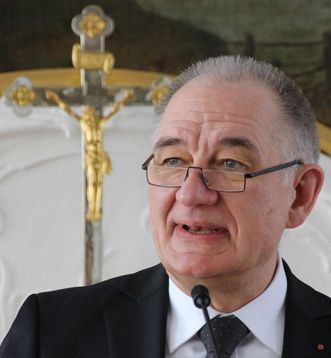Heeeeere we goooo.
After an exciting and exhausting synod process on marriage and family that involved the entire Catholic Church in heated discussion, rounds are already being fired in the run-up to next synod – and this before we even know what its topic is. Unconfirmed rumors are that Pope Francis wants the next Synod of Bishops to take up the question of ministry, including the possibility of optional clerical celibacy. So, let the discussion on celibacy begin!
 Breaking some stereotypes about what regions are supposedly ‘conservative’ and ‘liberal,’ out of Germany comes a defense of celibacy. The professor of liturgy at Ludwig Maximilians University in Munich, Germany, Winfried Haunerland, speaks out in an interview in the Sunday edition of the Münchner Kirchenzeitung (“Munich Church Newspaper”).
Breaking some stereotypes about what regions are supposedly ‘conservative’ and ‘liberal,’ out of Germany comes a defense of celibacy. The professor of liturgy at Ludwig Maximilians University in Munich, Germany, Winfried Haunerland, speaks out in an interview in the Sunday edition of the Münchner Kirchenzeitung (“Munich Church Newspaper”).
Haunderland states that the unmarried state of priests is not based upon a devaluation of marriage and sexuality. Rather, the renunciation of something good and valuable sends the signal that this world is not everything. Citing the words of Jesus on eunuchs for the sake of the kingdom of heaven (Matthew 19:12), he states that the church, and also the individual Christian, should not act in this world as if there is no future with God.
Haunerland notes that the Eastern Orthodox churches as well as the Eastern Catholics have married priests, and hence it is not absolutely mandatory. But he believes that lifelong celibacy and sexual renunciation makes concrete the total readiness of the person to serve Christ and the church.
On the shortage of ordained ministers, and proposals to address the shortage by a change in discipline, he says, “Certainly in the first phase there would be more men who would be ready to be ordained to the priesthood. But the deep cause for the small number of priests is more far-reaching. Life-long decisions, commitment to institutions such as the church, and a public life of faith have become more difficult today…”
Haunerland concludes as follows:
Priestly celibacy lives essentially from the fact that it is the common form of life of a group. If the individual repeatedly has to justify his celibacy, the freedom to marry would very rapidly have the consequence that any priest who does not wish to be an oddball will marry. The history of Protestantism is instructive in this. But above all everyone must be clear that loss of celibacy as the mandatory form of life of Catholic priests would necessarily have implications for the societal form of the priestly office. The married priest must repeatedly bring his availability for service to people into balance with his responsibilities for his own family. Of course many women and men in other vocations must also face this challenge. Not infrequently they protect themselves by making a sharp distinction between their work and the rest of their lives. But being a priest must be not only a job that concerns me within a limited time frame, but rather should characterize the person as a whole. The readiness to present myself for ordination as a priest presupposes the willingness not merely to make available my working hours and working abilities, but rather to let my very self be taken in service. And this must somehow be concretely perceptible in ones life. The celibate way of life calls to mind this high challenge very clearly, and it admonishes one ever again to be taken into service comprehensively. The complete loss of celibacy would thus be, for me, no progress.

Leave a Reply